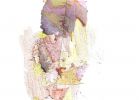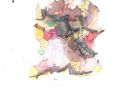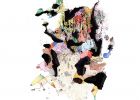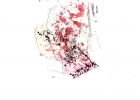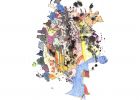Perspectivação e temporalidades (cosmo)técnicas (imaginativas): o livro-roteiro Angenommen como a culminação da escritura flusseriana / Perspectivation and (Cosmo)technical (Imaginative) Temporalities ...
This paper analyzes key passages of Vilém Flusser’s Angenommen from the point of view of the functioning of his writing. Starting out from the Flusserian theory of techno-imagination, the notion of anthropophagy (Oswald de Andrade), the concept of techno-diversity proposed by Yuk Hui and the Nietzschean doctrine of the eternal return the article proposes that the Angenommen constitutes a fundamental contribution to the problem of the destiny of philosophy. The text fits into a tradition of texts that proposes an intimate relationship between the eternal return, ghostliness, revolution, technique, and possibilities/potentialities. From Leibniz, to Benjamin, as well as Nietzsche and Blanqui, the idea of a possible world focused on the significance of temporality in Modernity. Angenommen institutes a circularity, a potential eternal return in the singular events that go beyond the circularity of past and future history based on the fictional hesitation of (un)probable possibilities. The apparent quasi-dialectical movement of the book proves to be a hellish circle from which there is no way out. The paradox at the heart of the work is that the freedom of imagination of (un)probable heterochronotopic scenarios is constrained by the instinctual repetition of anti-entropic principles. The (im)probably (im)possible phantasmagories replicate, as philosofictions, reality as a trauma.
Manifesto Anthrobscene
In 1940 on the onset of WWII, Vilém Flusser, his Czech family lost to German concentration camps, left Europe for Sao Paulo to become a Brazilian citizen, where he wrote and taught philosophy until 1972. In 1987, Flusser wrote Vampyroteuthis Infernalis, which one reviewer of the English translation compared to the writings of Jorge Luis Borges. In the spirit of Borges and Flusser, and set in Brazil, Yamashita’s presentation depicts the legacy of colonial processes that continue to destroy native populations, human and non-human, and to conceive of earth as inanimate, blind, mute, and utterly insensible. Divided into two parts, part one re-imagines Oswald Andrade’s “Manifesto Antropofágico” and Jonathan Swift’s “A Modest Proposal,” countering the empiric construction of native people as “savages” and innate cannibals. Part two re-composes a story told by a parrot, whose ancestor had been separated from her mate by Alexander von Humboldt. In 1799, Humboldt is said to have sent a parrot home to Prussia, the parrot being the last keeper of the language of an extinct Amazonian tribe. The descendant parrot and her interlocutor reconstruct a fabula composed in the register of dark humor about the deepest recesses of a forest (or the human id). In this primordial forest—reminiscent of a staging of Pina Bausch’s “Rites of Spring”—a fecund exchange occurs between sightless Mother Tongue and a ravenous Father Penis who “ate the eyes of everything.”
Seismic Cyst: Vilém Flusser’s Journalistic Philosophical Quasi-Poetry and Oswald de Andrade’s Telefonemas in the Corpus of Brazilian Philosophy
This paper relates Vilém Flusser's and Oswald de Andrade's philosophical approaches by examining and comparing Flusser's quasi-poetical way of writing philosophy in newspapers articles of the 1960s with de Andrade's Telefonema, newspapers articles of the 1940s and 1950s. It is analyzed their supposedly minor texts, setting the principle that the manifestos and the large theoretical novels that both composed could be present as a horizon of analysis. If it was to work with minor authors within a minor philosophy, it would be necessary to go even more to the micro. The purpose was to follow the fleeting traces of their literary-philosophical machines and their (dis)articulation with (neo)colonial powers. The assumption is that there is a similarity in the way they deal with the question of otherness, which is manifest in the approach that they do towards philosophy, literature and journalistic activity. They not only share several criticism and frustrations about the philosophical program that was intended to be established in Brazil but are also to be seen as exploring the boundaries between thought and literature, announcing and expecting philosophies to come.

